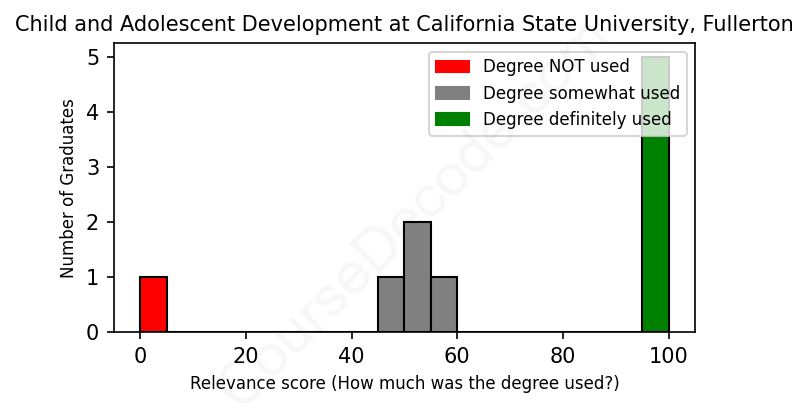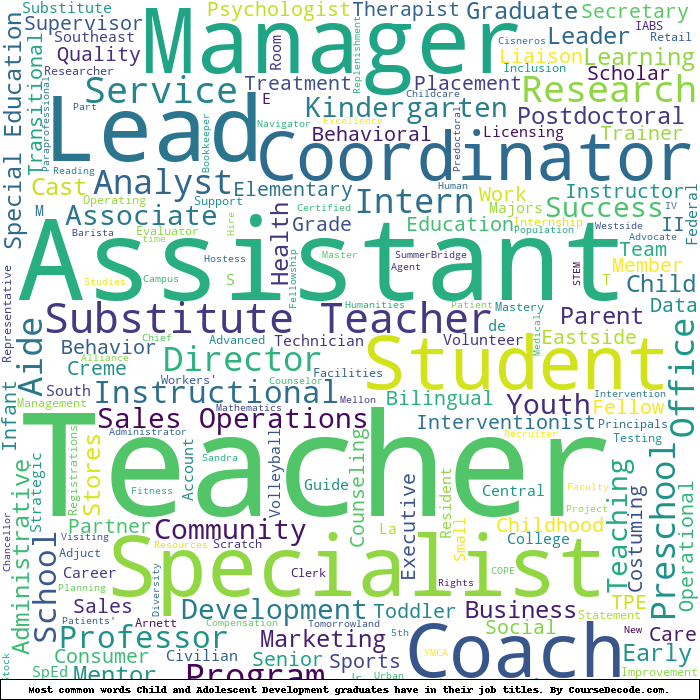
First, some facts. Of the Child and Adolescent Development graduates from California State University, Fullerton we've analyzed , here's how many have used (or NOT used) their degree in their career:

These are estimates based on AI analysis of 10 LinkedIn profiles (see below).
The verdict? Slightly above average. Overall, with an average relevance score of 69%, Child and Adolescent Development graduates from California State University, Fullerton have a slightly higher likelihood (+2%) of finding work in this field compared to the average graduate across all fields:
And for comparison, here's the chart for all profiles we've looked at across all degrees.
Also, after graduating, 60% of these graduates have pursued further education other than another Bachelor's degree (such as a Masters degree or other), compared to the average across all profiles of 35%. This suggests you may need more than just a Bachelors degree to be competitive as a Child and Adolescent Development graduate.
See the details:
|
Relevance score: 100% We think this person has gone into a career highly relevant to their degree. We think this person has gone into a career highly relevant to their degree.
DEGREE INFOGraduated in 2017 from California State University, Fullerton with a Bachelor of Science - BS in Child and Adolescent Development. No other secondary education since. JOB HISTORY SINCE GRADUATIONStudent Teacher Placentia-Yorba Linda Unified School District Aug 2017 - Aug 2018 Kidsters Lead  FRISTERS Aug 2018 - Sep 2019 Substitute Teacher  Santa Ana Unified School District Aug 2018 - Present ABOUTWorked with children for 7+ years in the classroom setting. Multiple Subject Teaching Credential and have a BS in Child and Adolescent Development. Enthusiastic and highly capable Elementary educator, promoting student learning. Skilled in TK-6 classroom and in distance learning environments. |
The top 10 most common jobs done by the graduates we've analyzed (ranked most common to least) are:
After checking out LinkedIn profiles of graduates from California State University, Fullerton who majored in Child and Adolescent Development, it seems like there are two main camps when it comes to jobs. A significant number of them have gone into educational roles, like substitute teachers, special education paraprofessionals, or elementary school teachers. These positions definitely make good use of their degree, as they require an understanding of how children learn and grow. For example, being an elementary school teacher or a reading interventionist involves directly engaging with kids and applying development theories in real-world educational settings, which is right on point with what they studied. On the flip side, there's a whole bunch of grads who took paths that don’t really relate to their degree at all. Jobs like retailer roles at Disneyland or office secretary positions do involve working with people, but they don’t tap into any of the specialized knowledge from Child and Adolescent Development. So, while some grads are really aligning their careers with their studies and making a difference in children's lives, others seem to be taking jobs that don’t have much to do with what they spent years learning about. It’s definitely a mixed bag!
Here is a visual representation of the most common words in job titles for Child and Adolescent Development graduates (this is across all Child and Adolescent Development graduates we've analyzed, not just those who went to California State University, Fullerton):

Looking at the career paths of graduates from the Child and Adolescent Development program at California State University, Fullerton, it’s pretty clear that many of them have found ways to stay connected to working with kids and families. For those just starting out, typical first jobs include roles like substitute teachers, paraprofessionals, and aides in educational settings or child-focused organizations, which makes sense given the degree. Many alumni who graduated in the early 2010s jumped right into educational support roles, while others took on positions that might seem a bit less relevant, like working at Disneyland. Still, even those roles often involve skills in communication and teamwork, which can be helpful later on.
Fast forward a few years—especially around the 5 to 10-year mark—and you see a solid trend. A lot of people are making strides toward becoming fully-fledged teachers, counselors, or educational leaders, which really aligns with their academic background. Some started as substitutes or aides and eventually moved into teaching roles, while others took opportunities in youth development or educational intervention, showing that they’re still in the game of supporting children’s growth. On the flip side, there are a few who have drifted into more administrative or seemingly unrelated roles, which might not tap into their child development knowledge as directly. Overall, it looks like most graduates are finding ways to build meaningful careers in their field, even if it takes a little detour to get there!
Honestly, a Bachelor's degree in Child and Adolescent Development at California State University, Fullerton, is generally manageable, especially if you enjoy working with kids and understanding their growth. The curriculum includes a mix of psychology, sociology, and education courses, which can be interesting and relevant if you're passionate about the subject. While some classes might be a bit challenging, especially those focused on research methods and statistics, many students find the material engaging and can relate it to real-life experiences. Overall, it strikes a pretty good balance between being challenging enough to keep you learning and being accessible so you can still have fun and enjoy your college life!
Most commonly, in the LinkedIn profiles we've looked at, it takes people 5 years to finish a Bachelor degree in Child and Adolescent Development.
So, if you’re looking at the job paths of these Cal State Fullerton graduates, it seems like their money-making potential is pretty varied. Many of them started off in roles related to education, like substitute teachin' or teacher's aide positions, which don’t usually pay super well, especially at the beginning. Those who worked at Disneyland got to cash in on some fun but still had jobs that likely didn’t bring in big bucks, like barista or sales lead. However, as they gained more experience, especially in teaching roles, their incomes probably improved – being a full-time teacher in California can offer a decent salary once you're established. Overall, it seems like the early years were more about gaining experience and some not-so-great pay, but with time and advancement, they’re likely heading toward better financial stability!
Here is a visual representation of the most common words seen in the "about" section of LinkedIn profiles who have a Bachelor degree in Child and Adolescent Development (this is across all Child and Adolescent Development graduates we've analyzed, not just those who went to California State University, Fullerton). This may or may not be useful:

Here are all colleges offering a Bachelor degree in Child and Adolescent Development (ordered by the average relevance score of their Child and Adolescent Development graduates, best to worst) where we have analyzed at least 10 of their graduates:
| College | Score | Count |
|---|---|---|
 California State University, Fullerton California State University, Fullerton
|
69 | 10 |